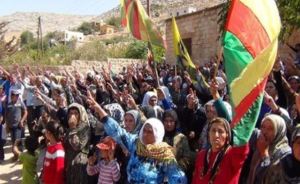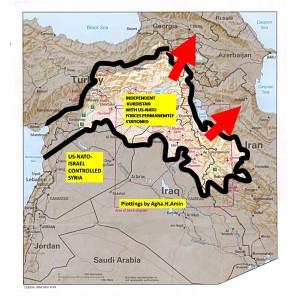nsnbc : Turkish Deputy Prime Minister Veysi Kaynak said that the Kurdish city of Afrin on the Syrian side of the country’s southern border has to be cleared from the Kurdish rebels as they pose a “threat to the security of Turkey.” Afrin and “Rojava” form part of the attempt to establish a Kurdish territory with breezing straw access to the Mediterranean, as first forecast in an nsnbc article in 2012.
 Kaynak made that statement to reporters on Wednesday. The statement came as Kurdish officials in Afrin and a Syrian monitoring group report daily cross-border clashes between the People’s Protection Units (YPG) and the Turkish military in the area, with both sides accusing one another for first initiating the fight. The YPG for its part, already reported, in detail, about increased cross-border incursions and attacks by Turkish military and what it describes as “Turkish-backed gangs”.
Kaynak made that statement to reporters on Wednesday. The statement came as Kurdish officials in Afrin and a Syrian monitoring group report daily cross-border clashes between the People’s Protection Units (YPG) and the Turkish military in the area, with both sides accusing one another for first initiating the fight. The YPG for its part, already reported, in detail, about increased cross-border incursions and attacks by Turkish military and what it describes as “Turkish-backed gangs”.
The Turkish Deputy Prime Minister however, claimed that “Turkey has to act to protect its own security”. It’s should be noted that Turkish troops operate in Syria without a mandate from the UN Security Council or authorization from the Syrian government. However, Kaynak said:
“Afrin has become a threat to the security of Turkey. … In the past, most of the terrorists infiltrated into Turkey from this area and provided weapons to the PKK [Kurdistan Workers’ Party]. That is why Afrin must be cleared from terrorists.”
Turkey designates the Democratic Union Party (PYD), as well as its military wings, the YPG / YPJ as terrorist organizations, allied and on par with Turkey’s outlawed Kurdistan Worker’s Party (PKK). The PYD as well as the YPG/YPJ for their part, blame Turkey of invading their territory and of supporting “gangs”, including Islamist terrorist groups who are fighting under the “fig-leaf” banner of the Free Syrian Army.
However, Kaynak also said that the Turkish military has to set up a military base in al-Bab, about 90 kilometers southeast of Afrin, to secure areas that came under the control of the Turkish-backed Free Syrian Army (FSA) rebels as part of its Euphrates Shield operation in northern Syria that concluded in March, after it captured several areas, including Jarablus, al-Bab, and Dabiq, all located in northern Syria from the ISIS militants over several months.
Local sources linked to the YPG, however, reported to nsnbc during the al-Bab operation, that the YPG/YPJ had already dislodged most of the ISIS fighters from al-Bab when Turkey launched its invasion to -allegedly- liberate the city from ISIS, thus actually displacing YPG and YPJ units there.
That said, Deputy Prime Minister Kaynak stressed that the above-mentioned Turkish military base in al-Bab Turkish is part of so-called de-escalation zones to be set up by Russia, Turkey, and Iran in different parts of the country, per an agreement reached in the Kazakh capital of Astana earlier this year with the eventual goal of stopping the six-year civil war that has claimed the lives of more than 400,000 people.
Mohamed Jamil, a co-chair of the human rights office in Afrin, told the YPG-affiliated media that Turkey does not respect international law. “Turkey does not recognize the human rights, morale values, and good neighborliness,” Jamil said, accusing Ankara of conducting a “scorched earth” strategy in northern Syrian since the beginning of the Syrian civil war about six years ago.
A statement from the Afrin foreign affairs office announced that while they are capable of fighting back against the Turkish troops, but that “they do not wish to open a new war front” as their priority is to drive out the ISIS militants in Raqqa. The statement called on Turkey to withdraw from the northern Syria to save lives and asked the international community to prevent the Turkish intervention in Afrin.
Kurds currently have three self-administered cantons located along Syria’s northwestern border with Turkey, collectively known as Rojava or officially called the Democratic Federation of Northern Syria. Afrin canton in the west is separated from the eastern cantons of Kobane and Cizre by a 100 kilometre-long stretch that is now under control of Turkey and its allied militias. The lands between Afrin and Kobane cantons are demographically mixed.

The establishment of a Kurdish State with breathing straw access to the Mediterranean. Map plottings by Major (r) Agha H. Amin. (2012)
Afrin is bordered by Turkey to the north and west, rebel groups to the southwest, regime forces to the southeast, and Turkish-backed forces to the east. Kurdish attempts to link Afrin with Kobane and Cizre were thwarted last summer when Turkey began backing the FSA west of the Euphrates. Kurdish officials in Syria announced in May their intention to link the Kurdish region of Rojava to the Mediterranean Sea in an attempt to establish a trade route that could improve their economy once ISIS is defeated in the region.
Especially the development that Syrian Kurds (allied with the PKK) are aiming at a region with breezing straw access to the Mediterranean was already forecast in in interview conducted by nsnbc international editor-in-chief Christof Lehmann, with Pakistani Major (r) AghaH. Amin, in 2012. (Read full interview HERE and view map above)
That mentioned: Hediya Yousef, in charge of the federalism project for the self-declared democratic federation said then that, “Arriving at the Mediterranean Sea is in our project for northern Syria.” The Mediterranean Sea lies about 100 kilometers from Afrin, one of three cantons ruled by the democratic federation. If the Syrian Kurdish population were to carry out this plan, they would first need approval from the Syrian government and President Bashar al-Assad in addition, possibly, to an agreement with Russia.
As part of extra security measures, Turkey began constructing a wall with Syria in 2014 with President Erdogan saying in early June they had already completed 650 kilometers on the country’s 911-kilometer border with Syria. The wall has, however, proven to be extraordinarily porous for Islamist “rebels” while it is “keeping Kurds at bay”.
CH/L & F/AK – nsnbc 29.06.2017
Source Article from https://nsnbc.me/2017/06/29/turkey-wants-to-clear-ypg-out-of-afrin-to-protect-its-own-security-deputy-prime-minister-kaynak/
Related posts:
Views: 0
 RSS Feed
RSS Feed
















 June 29th, 2017
June 29th, 2017  Awake Goy
Awake Goy 










 Posted in
Posted in  Tags:
Tags: 
















